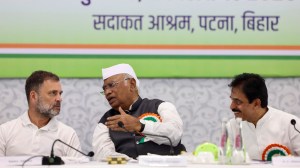In big relief for Punjab MBBS students, HC stays property clause
Medical aspirants had challenged the Punjab government’s decision to impose compulsory service bonds on MBBS and BDS students. The next hearing is on November 3.
 The bench found prima facie merit in the argument and directed the state not to insist on solvency documents on stamp paper.
The bench found prima facie merit in the argument and directed the state not to insist on solvency documents on stamp paper. The Punjab and Haryana High Court has granted interim relief to medical aspirants challenging the Punjab government’s decision to impose compulsory service bonds on MBBS and BDS students by staying the additional requirement of submitting a property-backed solvency certificate along with the bond, terming it unjustified
While a division bench of Justice Ashwani Kumar Mishra and Justice Rohit Kapoor granted the interim relief on September 19, the order was made public on Wednesday.
The petitioners, including Prisha Taneja and others, had moved the court against a corrigendum issued on June 13, 2025, by the Department of Medical Education and Research, Punjab. The corrigendum made it mandatory for All India Quota students to serve one year and State Quota students two years in government service, or pay ₹20 lakh in lieu. The July 15 prospectus for the 2025-26 academic session incorporated this condition, sparking protests from students who termed it “arbitrary, onerous and discriminatory”.
In court, senior advocate Amit Jhanji, appearing for the petitioners, argued that while the students were willing to submit the required bond and undertaking, the additional clause demanding a solvency certificate effectively created a mortgage of family property in favour of the university. “Such a condition is wholly unjustified and burdensome,” he submitted.
The bench found prima facie merit in the argument and directed the state not to insist on solvency documents on stamp paper. “Accordingly, the respondents shall not insist upon submission of solvency on Rs 100 stamp paper, provided the petitioners submit bond, on the specified format,” the court ordered.
The petition also challenges the very imposition of compulsory bonds, pointing to recommendations of the National Medical Commission, which do not mandate such service conditions. It argues that the bond violates students’ fundamental rights and places an unreasonable financial burden on them at the threshold of their careers.
The state government, represented by Additional Advocate General Animesh Sharma, defended the policy as a step to address the shortage of doctors in rural and underserved areas.
The matter will now be heard on November 3.







